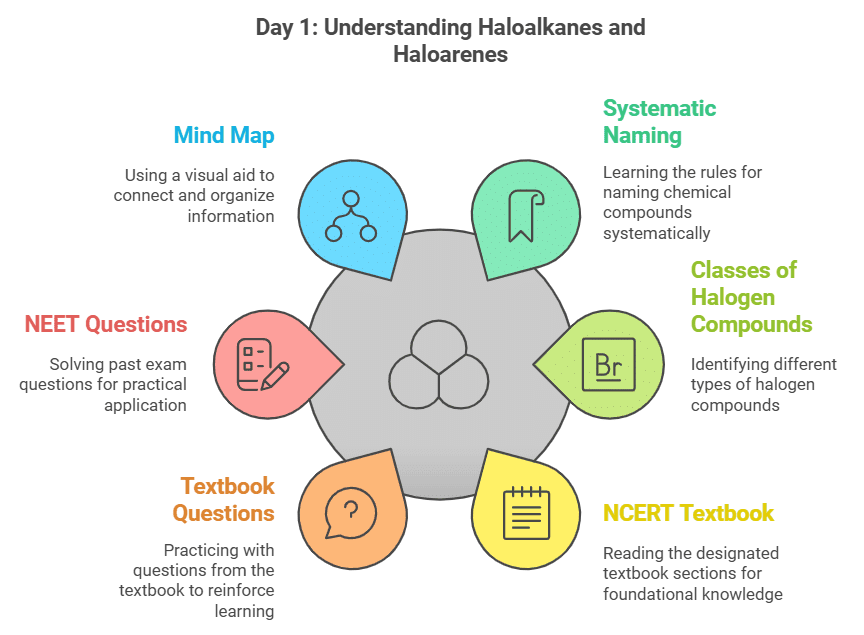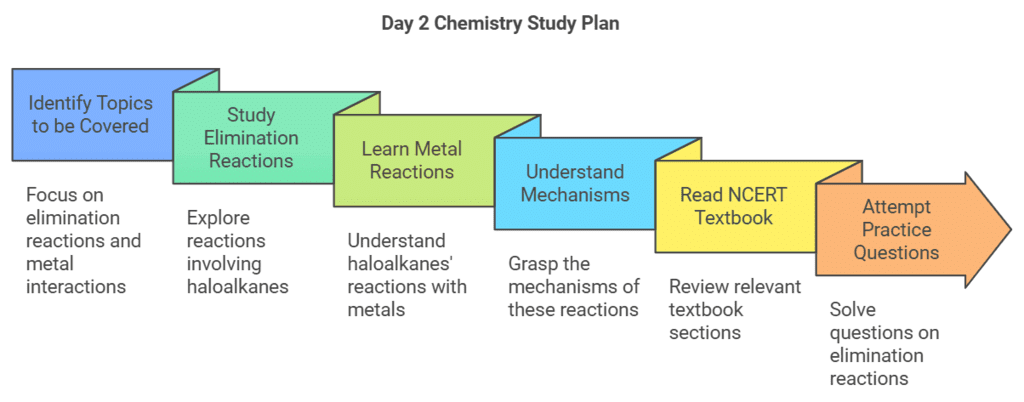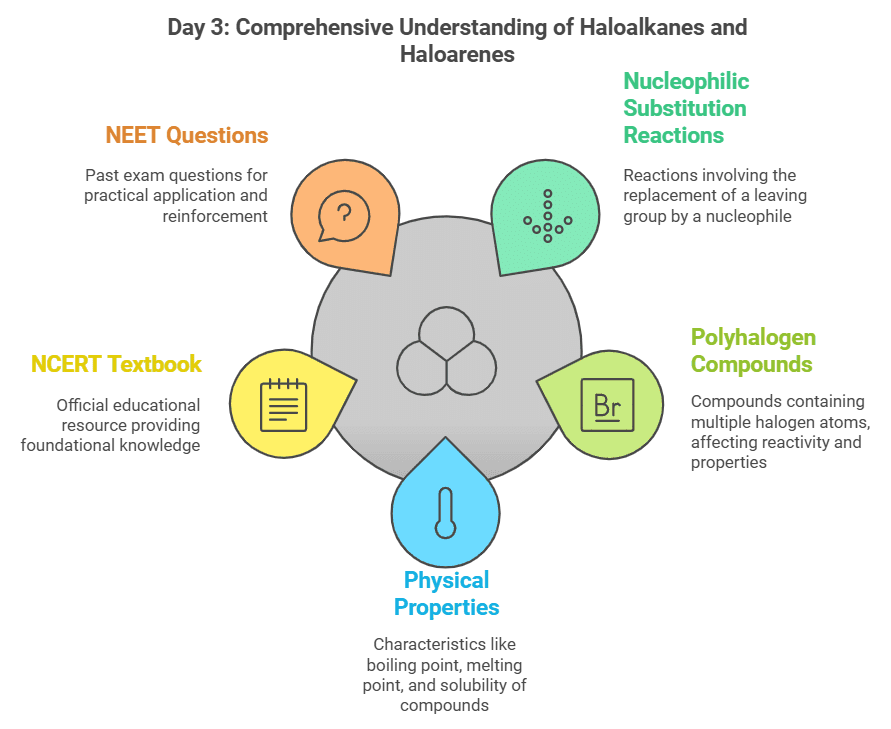4 Days Study Plan: Haloalkanes and Haloarenes | Chemistry Class 12 - NEET PDF Download
Let's explore the Class 12 Chemistry chapter called "Haloalkanes and Haloarenes" and understand its importance for the NEET exam. By studying the past years NEET questions (from 2016 to 2025), we can see that this chapter is crucial in the exam. If you want to score well in NEET, you need to grasp the concepts in this chapter.
Chapter Overview
This chapter comprises five main topics:
- Classification & Nomenclature of Haloalkanes & Haloarenes
- Chemical Reaction: Elimination Reactions & Reaction with Metals
- Chemical Reaction: Nucleophilic Substitution Reactions
- Polyhalogen Compounds
- Physical Properties of Haloalkanes & Haloarenes
Day 1: Classification & Nomenclature of Haloalkanes & Haloarenes
What to cover:
- Study the classification and nomenclature of haloalkanes and haloarenes.
- Understand the systematic naming of these compounds.
- Learn about different classes of halogen compounds.
Study Tips:
- Read the relevant sections in your NCERT textbook.
- Attempt questions from the textbook.
- Utilize NEET Previous Year Questions to practice.
- Refer to the mind map for visual aids.

Day 2: Chemical Reactions: Elimination Reactions & Reactions with Metals
What to cover:
- Study elimination reactions involving haloalkanes.
- Learn about the reactions of haloalkanes with metals.
- Understand the mechanisms of these reactions.
Study Tips:
- Read the relevant sections in your NCERT textbook.
- Attempt practice questions related to elimination reactions.
- Use NEET Previous Year Questions for practice.
- Review the short & long answer questions on haloalkanes and haloarenes.

Day 3: Chemical Reaction: Nucleophilic Substitution Reactions, Polyhalogen Compounds, Physical Properties
What to cover:
- Study nucleophilic substitution reactions involving haloalkanes and haloarenes.
- Learn about polyhalogen compounds.
- Explore the physical properties of haloalkanes and haloarenes.
Study Tips:
- Read the relevant sections in your NCERT textbook.
- Attempt questions related to nucleophilic substitution reactions.
- Review important formulas and concepts.
- Use NEET Previous Year Questions to reinforce your knowledge.

Day 4: Revision
On this day, focus solely on revising all the topics you have covered so far. Summarize key concepts, review important formulas, and attempt questions from the NEET Previous Year Questions document.
Remember, for detailed study materials and solutions to NCERT questions, you can always turn to EduRev. Utilize the platform's resources to enhance your understanding and preparation for the NEET exam.
By following this structured study plan, you'll be well-prepared to tackle the "Haloalkanes and Haloarenes" chapter in your Class 12 Chemistry and excel in the NEET exam. Good luck with your studies!
Here are all the important links and topic links for the "Haloalkanes and Haloarenes" chapter:
Important Links:
- NEET Exam
- NEET Previous Year Questions (2016-2025)
- Mindmap
- PPT: Haloalkanes & Haloarenes
- NCERT Textbook
- NCERT Solutions
- Short & Long Answer Questions: Haloalkanes and Haloarenes
- Video: Classification of Haloalkanes & Haloarenes
- Test: Characteristics of Halo Compounds
- Chapter: Haloalkanes and Haloarenes
Topic Links:
- Classification & Nomenclature of Haloalkanes & Haloarenes
- Chemical Reaction: Elimination Reactions & Reaction with Metals
- Chemical Reaction: Nucleophilic Substitution Reactions
- Polyhalogen Compounds
- Physical Properties of Haloalkanes & Haloarenes
You can access these resources to enhance your understanding and preparation for the "Haloalkanes and Haloarenes" chapter in Class 12 Chemistry. Good luck with your studies!
|
75 videos|278 docs|78 tests
|
FAQs on 4 Days Study Plan: Haloalkanes and Haloarenes - Chemistry Class 12 - NEET
| 1. What are the main types of haloalkanes and haloarenes? |  |
| 2. What are elimination reactions in haloalkanes? |  |
| 3. How do nucleophilic substitution reactions differ from elimination reactions? |  |
| 4. What are polyhalogen compounds and their significance? |  |
| 5. What are the physical properties of haloalkanes and haloarenes? |  |

















